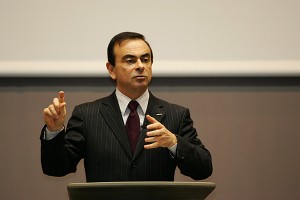It’s expensive in Tokyo. But Nissan Chief Executive Carlos Ghosn shouldn’t have to worry much about the price of sashimi – the Brazilian-born executive drawing a paycheck of nearly $12 million last year.
That figure, which includes pay, stock options and bonuses, doesn’t include the $1.7 million Ghosn also collected from Nissan’s French alliance partner Renault, where he also serves as CEO.
Ghosn’s 2010 compensation made him the highest-paid “gaijin,” or foreign, executive in Japan, readily out-earning Sony’s CEO Howard Stringer, who made $10.66 million for 2010, as well as the managers at Nissan’s primary automotive rivals. By comparison, Akio Toyoda, the founding family heir and chief executive at Toyota, made $1.8 million, while Honda’s Takanobu Ito had to get by on a mere $1.6 million.
But while lavish by Japanese standards, Ghosn’s remuneration was modest in comparison to the paycheck taken home by Ford Motor Co.’s top two bosses. Chief Executive Officer Alan Mulally’s total package nudged up towards the nine-figure mark, including the $56 million in stock he was awarded, while Ford Chairman Bill Ford Jr. claimed $42 million in stock on top of his pay and bonuses.
Japan, like Europe, has traditionally frowned upon excessive executive pay, though that has been changing in both regions thanks to globalization. Daimler managers, for example, saw a big bump up in their annual awards following the German maker’s abortive takeover of Chrysler.
Meanwhile, Japanese figures often underestimate the real value of what an executive earns as top managers can often count on multi-million-dollar housing allowances and membership in top-tier golf clubs, some of which cost more, on a yearly basis, than a top Tokyo apartment.
Whatever Ghosn got, stockholders seemed more than happy to go along at their annual meeting, this week, reflecting the second-largest Japanese maker’s increasing good fortunes. Despite the impact of the March 11 disaster that briefly shut down most of the country’s auto industry, Nissan expects to post yet another sales record for the 2011 Fiscal Year, and despite the quake – and lopsided exchange rates – the maker expects to see only a modest downturn in earnings for the year. By comparison, Honda and Toyota forecast their profits could plunge by as much as two-thirds.
Meanwhile, the 57-year-old Ghosn this week unveiled a new 6-year Power 88 plan that calls for a nearly 50% increase in sales, to 8 million annually, with profit margins targeted to climb to 8%. (For more on Power 88, Click Here.)
But not all has gone smoothly for Ghosn in recent months. The executive’s tenure at Renault briefly appeared shaky due to an espionage scandal that led to the ouster of some senior managers accused of spying for the Chinese. It turned out to be a shakedown attempt by members of the automaker’s own security department.
Ultimately, Ghosn was spared, but his top lieutenant, Renault Chief Operating Officer Patrick Pelata, took a major demotion.

